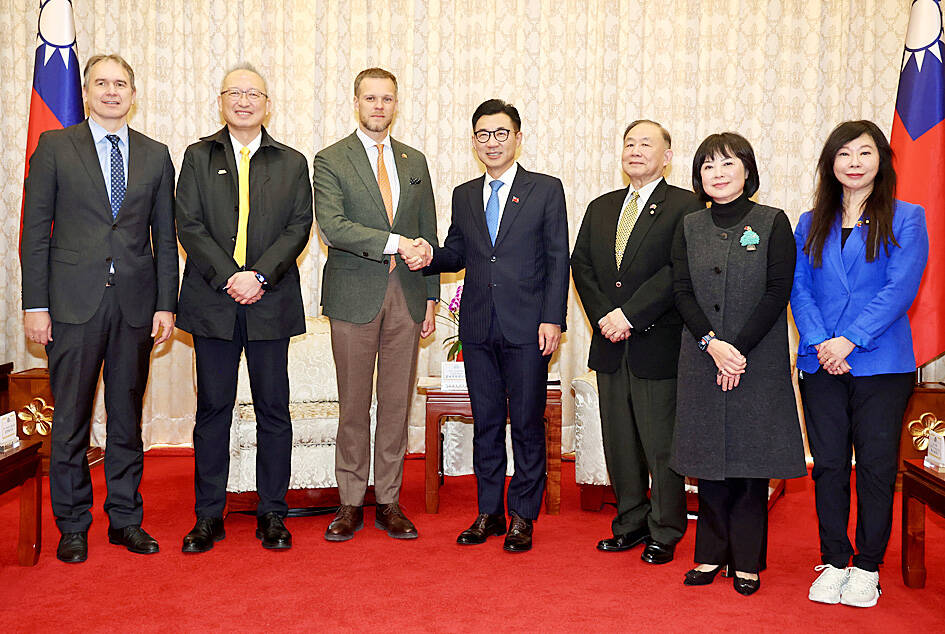Former Lithuanian minister of foreign of affairs Gabrielius Landsbergis said it would be an “enormous mistake” if his country’s new government succumbed to Beijing’s pressure and changed the name of Taiwan’s representative office there.
Landsbergis, who arrived in Taipei on Sunday for a five-day visit, was asked in an interview before he departed from Lithuania about China’s reported pressure on his country’s government to change the name of the Taiwanese Representative Office in Vilnius.
He said that despite Beijing’s repeated demands, the Lithuanian government has long pushed back on the issue, which is Lithuania’s “sovereign decision” and “a matter of principle.”

Photo: CNA
It would be a huge misstep if the new Lithuanian government yielded to Beijing’s demands to change the name, he said.
“It would be an enormous mistake, and it would be difficult to imagine successfully fostering the relationship between Taipei and Lithuania further,” he said.
Landsbergis said he fully recognizes that “it is more than just a name. It is part of [Taiwan’s] identity.”
The controversy arose in 2021 when Taiwan opened a representative office in Vilnius under the name the “Taiwanese Representative Office in Lithuania.” Beijing opposed the inclusion of the word “Taiwanese” in the name and began pressuring Lithuania to have it changed.
Taiwan’s representative offices in countries with which it does not have diplomatic ties are typically named the “Taipei Economic and Cultural Office” or “Taipei Representative Office,” in keeping with the host countries’ preference to avoid any references that would imply Taiwan is a separate country from China.
China responded to the office’s opening by recalling its ambassador to Vilnius and expelling Lithuania’s ambassador to Beijing. It also suspended direct freight rail services to the Baltic nation and severely restricted Lithuanian products’ access to the Chinese market.
Landsbergis was the chair of the center-right Homeland Union from 2015 to last year. He stepped down from that position in October last year after his party lost the parliamentary election runoff to the Social Democratic Party.
The country’s new prime minister, Gintautas Paluckas of the Social Democratic Party, has said he wants to restore full diplomatic relations with China, but his administration has not commented on the possible renaming of the Taiwanese Representative Office in Lithuania.
On the issue of Paluckas’ stance on China, Landsbergis said Beijing was responsible for the prickly relations between the two countries.
“They decided to sanction us,” he said. “I mean they decided, and they can decide differently … I wouldn’t object.”
“The question is whether we are doing certain things, trying to please China,” he added.
Landsbergis said he would be “really disappointed” if his country’s government bends to Beijing.
In November last year, Minister of Foreign Affairs Lin Chia-lung (林佳龍) said Taipei was not opposed to the new Lithuanian government restoring relations with China.
Beijing-Taipei-Vilnius relations are not a “zero-sum game,” he said.

A strong continental cold air mass is to bring pollutants to Taiwan from tomorrow, the Ministry of Environment said today, as it issued an “orange” air quality alert for most of the country. All of Taiwan except for Hualien and Taitung counties is to be under an “orange” air quality alert tomorrow, indicating air quality that is unhealthy for sensitive groups. In China, areas from Shandong to Shanghai have been enveloped in haze since Saturday, the ministry said in a news release. Yesterday, hourly concentrations of PM2.5 in these areas ranged from 65 to 160 micrograms per cubic meter (mg/m³), and pollutants were

Taiwan’s armed forces have established response protocols for a wide range of sudden contingencies, including the “Wan Chun Plan” to protect the head of state, the Ministry of Defense (MND) said today. After US President Donald Trump on Saturday launched a series of airstrikes in Venezuela and kidnapped Venezuelan President Nicolas Maduro, concerns have been raised as to whether China would launch a similar “decapitation strike” on Taiwan. The armed forces regularly coordinate with relevant agencies and practice drills to ensure preparedness for a wide range of scenarios, Vice Minister of National Defense Hsu Szu-chien (徐斯儉) told reporters before a

EVA Airways on Saturday said that it had suspended a pilot and opened an investigation after he allegedly lost his temper and punched the first officer several times as their plane was taxiing before takeoff at Los Angeles International Airport. According to a report published on Thursday by The Reporter, the incident occurred after the flight’s Malaysian first officer tried to warn the Taiwanese pilot, surnamed Wen (文), that he was taxiing faster than the speed limit of 30 knots (55.6kph). After alerting the pilot several times without response, the first officer manually applied the brakes in accordance with standard operating

NOT AN OPENING: Trump’s violation of international law does not affect China’s consideration in attacking Taiwan; Beijing lacks capability, not precedent, an official said Taiwanese officials see the US’ capture of the president of Venezuela as a powerful deterrent to Beijing’s aggression and a timely reminder of the US’ ability to defeat militaries equipped with Chinese-made weapons. The strikes that toppled Venezuelan President Nicolas Maduro signaled to authoritarian leaders, including Chinese President Xi Jinping (習近平), US President Donald Trump’s willingness to use military might for international affairs core to US interests, one senior official in Taipei’s security circle said. That reassured Taiwan, the person said. Taipei has also dismissed the idea that Trump’s apparent violation of international law could embolden Beijing, said the official, who was not